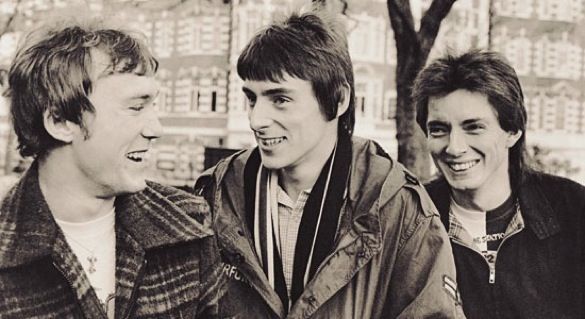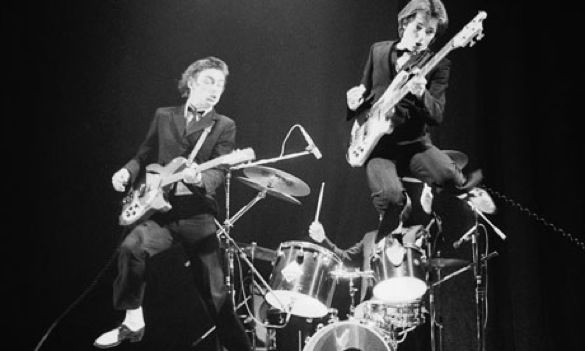
Left to right: Rick Buckler, Paul Weller, and Bruce Foxton
I was recently reminded that it was 35 years ago this past spring that a punk band from England first started making wave. The Jam, made up by guitarist Paul Weller, bassist Rick Buckler, and drummer Bruce Foxton came from Surrey, England, made a loud noise as they brought their brash sound to the public. Bold and brash, the band looked for inspiration in the 196s Beat Music, a bit of Rhythm 'N Blues, and a healthy appetite for the early 1970s Punk to bring their own sound to the table. While still having an edge, and plenty of anger, The Jam had a bit more polish, a bit more melody than many Punk bands, making them an early New Wave band, a movement of music still brewing in England in 1977, when The Jam were recording their first single.

I was reminded about The Jam when I read that next week, November 25th, UMC-Polydor is releasing an 8-album Vinyl box set of the band, who made quite the stir in the five years they were together recording. The collection includes all six studio albums, 1977's 'In The City', 1978's 'This Is the Modern World' and 'All Mod Cons', 1979's 'Setting Sons', 1980's 'Sound Affects' and 1982's 'The Gift'. It also includes several non-album singles and B-sides, and a color hardback book with liner notes. There are other treats for fans, including period photos, a download card for all the music, and a new introduction written by the Mod-father himself, Paul Weller. Sounds great, doesn't it? Well all that inspired me to get another listen to the band, and to share that with you. Today, I will look to the non-album singles, some truly amazing songs, to remind me why I love the band. I will start with "News of the World", a 1978 single written by Bruce Foxton, and featuring him on the vocals, a rarity for The Jam recordings. The song takes a look at the world through the distorted eye of the British tabloid in the title.
In 1979, the band released "When You're Young", takes another look at the world they were living in, only through the eye of a teen eager to take on the world, and correct the wrongs they feel society is perpetrating on them and their friends. Once again, the sound was big, but polished. They influences of 1960s Pop-Rock of Cream and The Animals more obvious than the Punk Rockers of the early 1970s. The song captures an attitude of the day, and deliver it with music. This is The Jam singing "When You're Young".
"Absolute Beginners" was released in 1981, having been written by Weller, who was inspired by the novel of the same name by Colin MacInnes in 1959, a favorite of Weller. It must have truly spoken to Paul's soul, what with the examination of the life of some of the London youth, those from the edges of society. The characters embody the issues the 'Mods' were dealing with, like class struggles, drugs, and racism high on the list. And those issues are touched on "Absolute Beginners".
And, finally, in 1982, the group released "Beat Surrender", a high-powered song that shows even more polish, and you can literally feel the way Weller was transforming as a songwriter and performer, and see his next band, The Style Council, on the horizon. There vocals were tighter than ever, and the sound moved away from the Rock roots to find more Soul influences. While I do love the song very much, it did seem to lack the edgier side, the anger that could be found in the earlier work. But I couldn't stop playing it then, and I find the same is still true. This is The Jam singing 'Beat Surrender'.
This was the final offering from the band, who broke up in December of 1982. It was said Buckler and Foxton didn't speak to Weller for more than two decades, as they were that angry about the band ending. In 2006, Paul and Bruce mended their fences, and even played together a few times. However, the same could not be said about Rick. Weller moved on to form The Style Council with Mick Talbot, joining the New Wave movement with their soulful sounds, and their New Romantic look at life. The Jam were more about the sounds of the streets, of teen life, and bubbling undercurrent of tension in society. Social issues were no strangers to the band, who sang of police brutality, drugs, life on the streets, and other topics not 'acceptable' in civilized conversation. But who said Rock bands needed to be civilized? Certainly not Paul Weller, Rick Buckler, and Bruce Foxton, at least not in the 1970s.

No comments:
Post a Comment